Handling Triangle Agency's Anomalous Materials
It’s the TEETH RPG newsletter! Manifesting from an intrusive thought straight into your inbox. Written by Marsh Davies and Jim Rossignol.
Hello, you.
Actual physical copies of our games!
Links!
Triangle Agency: A Performance Review (with Dr Noel Warford)
Hello, you.
Doubtless you've heard more than you might ever want to about tariffs. But, to summarise:
They're a tax on imports to the US, paid by Americans.
They are bad.
They don't affect books, yet.
They are changing by the day.
We print our books in the beautiful country of Lithuania, which is part of the EU, and ship them to locations in the UK and the US for further distribution to readers. As things stand, the forthcoming print of GOLD TEETH wouldn't be hit by tariffs. However, because of the tariffs, the cost of both printing and shipping will likely rise. Currently, this is a cost that we will absorb, and not pass on to our US backers—and we would hope to do this even if tariffs were introduced on books. But we can't pretend to know what will happen tomorrow. It’s what people dealing with disasters called a “fluid situation”.
If you are one of our TWENTY heroic mega-tier backers, you are due a poster portrait. These were to be printed imminently, but it's currently unclear if tariffs apply to these or not. Please bear with us while we investigate our options to get these to you.
What a bummer way to start the newsletter. It's both awful AND boring! But you know what isn't awful or boring? Actual physical copies of our games!
Love,
-Marsh & Jim
Actual Physical Copies Of Our Games

So we’ve got hold of the remaining stock of our original print runs. There are some physical copies of the TEETH book, all three zines, and the maps, but there aren’t many of the latter.
We opened a shop to sell this remaining stock.
VERY IMPORTANT SHIPPING NOTE: We are shipping from the UK, and can only ship to UK, EU, or US addresses for this batch of books. Costs differ accordingly.
If you want a physical copy, or just want to support the (now slightly alarming) costs of running this newsletter, then you can get them at the link above. We will also supply compelementary PDFs via itch.
We’re putting up batches of the core book so that Jim doesn’t get overwhelmed by trips to the post office. Don’t panic if it comes up as sold out, these will be restocked at least once.
However, there are just a handful of zine bundles and copies of the map remaining. So keep an eye on that!
Note again: these are being shipped from the UK only, with shipping costs accordingly.
Links!
As we’ve mentioned elsewhere, Quinns’ actual play of Skyrealms of Jorune is quite the thing, and as a Patreon backer (the first one’s free!) I can report that the ongoing campaign is one of the most amusing and compelling adventures I’ve been any kind of party to. Try not to miss out.
If, like us, you missed The Beasts and Blessings of The Hallow’d Hall, you can still do a late pledge. And given the look if it, and its relevance to our interests, you might want to.
Jim and Kieron are also still blogging, and our post-match report on Beowulf: Age Of Heroes is over on Old Men Running The World. Jon Handiwork was inspired to say a few things about the Followers system in that game, too.
That incredible Marathon trailer made me think that the visual design here is going to inspire an entire generation of saturated coloured, plastic sci-fi action TTRPGs in the coming years.
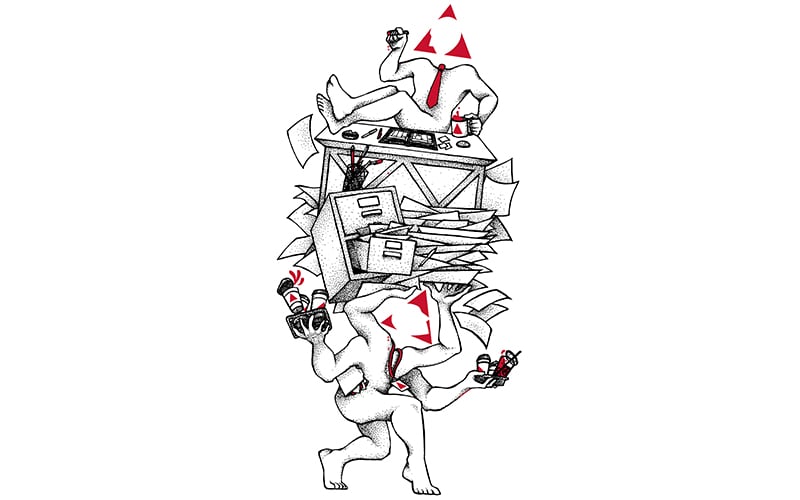
Triangle Agency: A Performance Review (with Dr Noel Warford)
Not enough people are talking about Triangle Agency. That might be just the way the clandestine Agency likes it. Maybe, even as I type, their operatives orchestrate a psy-op to smear this newsletter as the ravings of fringe fantasists, leaking deep-faked videos of myself and Jim in compromising scenarios with hogs. As for the highly successful Kickstarter back in June 2023? Didn't happen. The whole campaign was a mass-delusion resulting from ergot poisoning. Or maybe it's like that thing where people remember cheese-and-onion crisp packets being the wrong colour. Nothing to worry about—just go on with your lives. Pay no attention to your disappearing coworkers, or the alarming uptick in arson, or the black cloud in the shape of a face hovering above town. Did you just see a man-sized squid phase through a solid wall in a shower of lanyards? NO.
Well, that's just what The Man, wants you to think! But I'm not afraid—I'm going to blow the whole thing wide open! Triangle Agency exists! And it's fucking great.
"A game of paranormal abilities, corporate horror, and dangerous Anomalies," is how it sums itself up—and, at first, its cheery blend of SCP Foundation and Severance might suggest something enjoyably derivative. In play, it is anything but, with novel spins on the basics of interaction, on character progression, on the very layout of the book, that elevates this to being something persistently and delightfully surprising, setting the players up for wild and thrilling improvisation, and building those adventures into a larger drama that goes to places I had not imagined at the outset.
As newly minted agents, each gifted with their own strange power, the players are tasked with investigating Anomalies. Typically these are caused by an obsessive or potent thought that has itself gained sentience, warping reality in service of its desire. The powerful catharsis of a happy hour at a local Applebee's creates an Anomaly which seeks to perpetuate that Thank God It's Friday! feeling indefinitely, trapping hapless office-workers in a forced celebration of chicken wanton tacos and mozzarella sticks. The viral success of an ASMR-adjacent house-cleaning TikTok influencer becomes manifest as a malevolent sponge that seeks to return everything to a more perfect, pure state. The black cloud in the shape of a face? Well, we didn't figure that one out—but we did shoot it with a gun while luring hundreds of Cybertrucks into a quagmire, so I count that as a win.
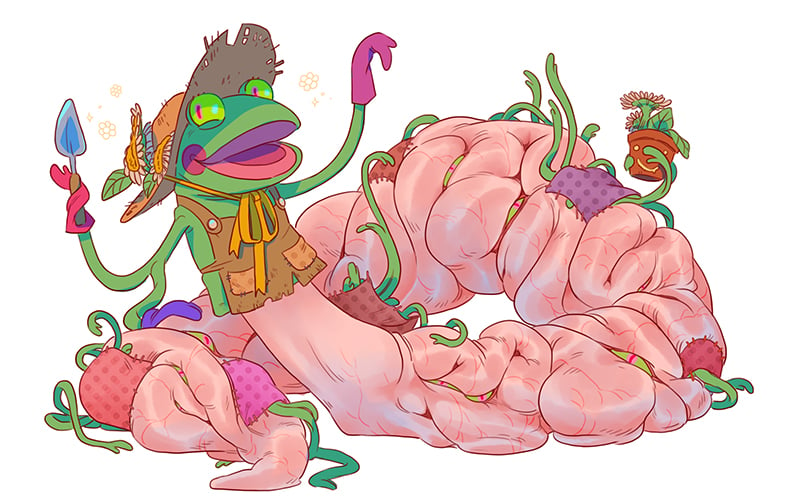
How you tackle each Anomaly is open-ended, but you might seek to satisfy its desire, or demonstrate its flaws. One of my ingenious fellow players defused the situation at Applebee's by explaining that Thank God It's Friday! is a feeling whose value only exists in contrast to the other days of the week—so a perpetual after-hours party is anathema to the very notion that inspires it. Weakened by this logic, the Anomaly could then be captured.
But getting to this point is perhaps even more fun: the process of investigation itself, trying to figure out the parameters of the Anomaly from fragmentary clues. Complicating this is the fact that the players have no special jurisdiction. They must get what they need and get out, leaving the general public and law enforcement none the wiser, tying up loose ends to maintain the perception of normality. But to do this, they do not themselves take actions in the regular roleplaying sense—in fact, agents are abnormally hapless people whose attempts to surmount any adversity are guaranteed to fail. Instead, they ask the Agency to alter reality in such a way as to render their task trivial—a sort of extreme version of Blades in the Dark's flashbacks. Don't try to sneak past a guard; ask the Agency to have previously purchased the company that makes the guard's protein shake, and contrive a factory accident that spikes a batch, causing the guard to dash to the toilet in gastric distress at the very moment you need to get by.
Of course, each agent is also fused with an Anomalous power of their own, and so while they can't Fight, Prowl, Surveil or any of those other verbs you might expect to test in a roleplaying game, they are granted a small number of extraordinarily powerful, but very situational abilities. The design of these is just a delight, so colourful and evocative. My character can extend a desperate deadline by checking his watch and declaring, "We've got time!", another can interrogate the history of absences, and another can summon a degenerate duplicate of themselves from any container large enough to hold them. But with every flex of these paranormal muscles, you are gifting Chaos to the GM, a currency with which they can purchase hideous interventions.
Perhaps even more thrilling than all this are the things I can't say about the game. As the players progress, they gain access to parts of the book that were previously forbidden to them, and are exposed to new things that threaten to totally change their character and perception of the setting itself. Because there is so much to spoil, and because I am merely a player, I'm not sure I can fully adjudicate on the game without guidance from someone who has seen behind the curtain. Who better than the GM of the game I am playing? That's none other than Dr Noel Warford.
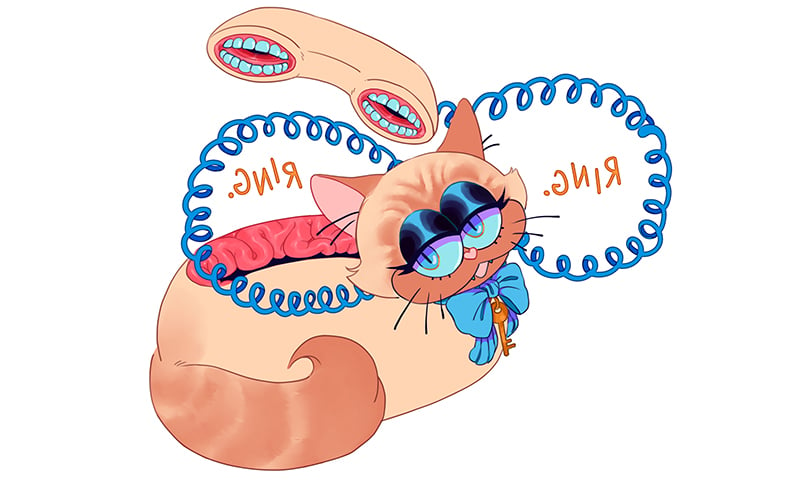
Marsh: Hello Noel! I've absolutely loved the campaign you've run so far, and clearly a lot of that is to your credit—the Anomalies mentioned above are entirely your invention, for instance—so while the player-facing parts of Triangle Agency are obviously excellent, I don't know exactly what's under the hood. What's it like to GM?
Noel: The thing that really jumped out to me is that most of my favorite games—Blades in the Dark, Stone Top or Urban Shadows or something like that—assume heroic characters who can do things. And that is not what's happening when you're playing Triangle Agency.
Marsh: Right, no.
Noel: Explicitly in the rules, if you attempt to do something, it will fail. And so that mindset shift has been an interesting challenge. Normally I'd be like, oh, am I being too adversarial as the GM? Am I being too "No, you can't do that"? But your agents have no skills! They have to ask the Agency to change reality on their behalf. That turns out to be fascinating and very, very powerful—but it did take us a while to get used to how asking the Agency was supposed to work and figuring out the scope of the things you can ask for. In terms of what it looks like to prep the game as GM, there are some clear components to an Anomaly that are spelled out in the book. The thing to always start with is the focus of the Anomaly, the emotion that it exists to create. And you have to work backwards from there: how do I cause this emotion to happen? And what is the thing that the Anomaly is doing that gets the Agency's attention? I always try to craft a really clear hook, but it's pretty easy in this game because you have a general manager at the Agency who just tells you what your mission is, right?
Marsh: Mm-hmm. And not only do you get that specific briefing, but the Agency has to provide these almost fourth-wall-breaking conditions in which the players will earn commendations and demerits during the course of the investigation—and, at least in our games, you used them to foreshadow things we'd encounter or things we might pay attention to, often in funny ways. Being told at the outset of the investigation, before you have any idea of where it's going to lead, that you should on no account destroy important paperwork, only to inevitably encounter situations where that is near-unavoidable, is very enjoyable in a dramatic irony sorta way. So I feel like the game does quite a lot to set the players up for success—which is important, because the highly-authored nature of the Anomaly necessitates that you have a static set of facts that underpin the mystery, compared with something like Brindlewood Bay, where the players themselves basically improvise the truth of the situation. Do you feel there is a greater risk of getting stuck in Triangle Agency than other mystery games, and does it even matter, given that the repercussions for failure are folded into the larger arc in a meaningful way?
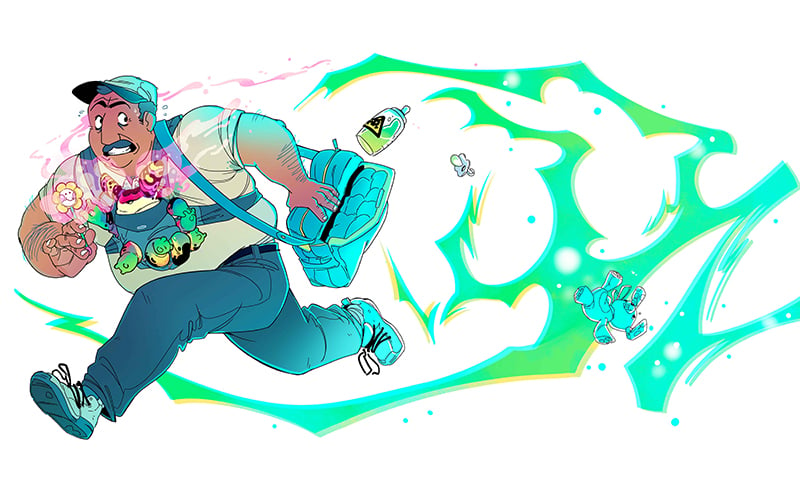
Noel: Right. So, I would say that Brindlewood Bay is not a mystery-solving game, so much as a storytelling game about creating a mystery collaboratively. Having a mystery that you are there to solve requires a certain level of ground truth, but in Triangle Agency there are many, frankly absurd ways that you can find things out: the game has a lot of tools in its toolbox to help players. Part of my prep that's not from the book, is that I've done a lot of reading over the past couple of years about what it takes to write a good mystery for roleplaying games. I want to give lots of credit to Justin Alexander, whose blog, The Alexandrian, has been very inspirational to me. He has these two related principles. One is the Three Clue Rule, which says that for any conclusion that you want the players to reach, you need to provide at least three clues. That requires you, the GM, to think about the different pieces of the mystery, the different people, the different locations, and ask: do I have three clues somewhere in this scenario that point to this thing? And the corollary to that rule is that each individual scene, or node, should have three clues that lead to something else. A lot of people have complaints about mysteries in TTRPGs—the classic example is you're playing D&D or something else with a binary yes/no fail-state. And you roll an Investigation check to examine the murder scene and you fail. And then you get no more information.
Marsh: That does suck.
Noel: It's a classic problem that people have spilled much ink about over the past 50 years of the hobby, I'm sure, but I think that Three Clue Rule goes a long way towards solving it because there will always be other opportunities to discover clues. I don't think I've always done a great job of this in our sessions: there was that one mission where there was a weird, obviously Anomalous cloud in the shape of a human face, and you couldn't figure out what it was exactly. But it was interesting how you resolved that anyway: you shot it with the Ripple Gun [an Agency-provided weapon the players always have at their disposal, should capturing the Anomaly prove impossible]. So that's kind of the escape valve, right?
Marsh: Right, yeah: if you fail to Sherlock your way to the truth, you can simply fucking shoot the thing. It's very cathartic!
Noel: You don't get as much credit for it, but it at least solves the problem. In that instance, I don't think I did a good enough job of providing clues to identify the focus of the Anomaly. It's easy to be too stingy with that information. And I have to check myself on that impulse and be like, no, be generous, tell people what's going on.
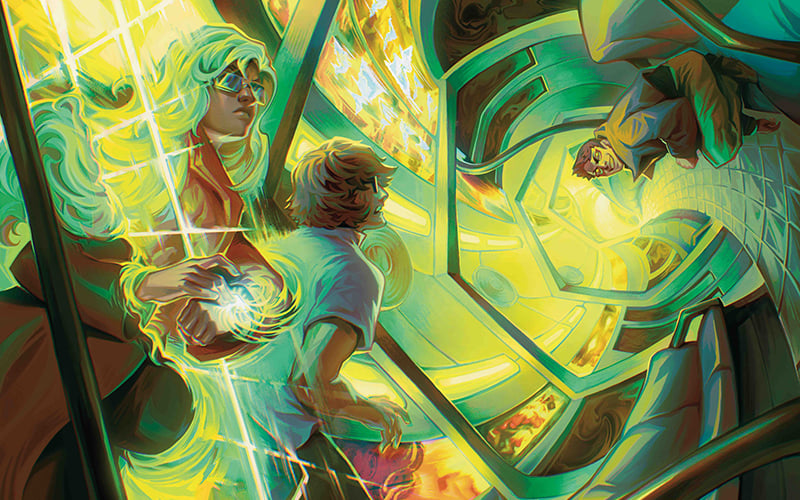
Marsh: Does the GM section of Triangle Agency have other good advice in how to set up a mission?
Noel: Yeah. There are good suggestions about types of missions—but one of my favorite little bits of advice is about creating good, mundane, but interesting NPCs. They suggest creating characters who are at one or the other end of three sliders. The first is observant to clueless; the second is stubborn to easygoing; and the third is lucky to cursed. It's surprisingly effective, particularly in Triangle Agency, because this game cares so much about loose ends, people having evidence of the supernatural—which puts them in the Agency's way—but also demonstrates how the Anomaly and your actions have impact. I have not shied away, I think, from making it clear what is happening to this small town in the Midwest of the US.
Marsh: Totally. The social connections that each of the player characters have in the civilian populace reflect poorly upon what we as the Triangle Agency have attempted to accomplish! Maybe we can talk about the dice rolls a moment, because I think they help to create a pretty unique sense of pace to the investigations. Instead of having different numbers of dice for different skills, or trying to manipulate a dice pool to get a high number, you always roll six d4. If any of them turn up a 3, you succeed. Not higher, not lower: just the number 3. But for every dice that is not a 3, the GM earns Chaos, a narrative currency with which they can purchase horrible interventions. The player meanwhile can spend "QAs", which allow them to turn any dice into a 3, if they wish—but this is a limited resource that you can rapidly deplete. So you aren't really managing the chance of success or degrees of success, as in other games—you are choosing to defer disaster and how much disaster you're willing to court. This means at the outset of an investigation, things tend to move quite quickly because you have a lot of QAs to spend turning failure to success. And I think that's what you want: it's good to make brisk progress unraveling the mystery while sowing the seeds for sudden escalation in peril. But what does that look like from the perspective of the GM? Seeing the GM earn Chaos creates trepidation but maybe that's just theatre—I wonder if it's trammelling you to react in a mechanical way when you might prefer your actions to emerge more naturally from the narrative?
Noel: You know, I wondered about that, but I haven't actually found that to be the case, personally. If anything, I should be spending Chaos more freely. I like that it gives me permission to do things that are really intense. It only costs me 10 Chaos to straight-up kill an NPC, if I so desire, and 30 to kill an agent—and, if they're in the domain of the Anomaly, I can spend Chaos at three times its value and do certain things for free. And I wouldn't underestimate the value of that theatre, right? Several times you have spent all your QAs just to reduce the Chaos I'm getting. The fear creates a wonderful feeling that I wouldn't want to trade away. Also, I think one of the most difficult moments in Blades is when people keep rolling 1-3 over and over, and the GM is forced to think of both the best and most gut-wrenching consequence every single time you roll. Having Chaos build up and spending it in moments that are really impactful has actually been kind of nice. It takes some of the pressure off. Plus the list of things that I could do is a lot of fun, even early on in a mission, like spending one or two Chaos to change the environment in spooky ways. I think I did that to remove a door handle from a door, which created a fascinating little scene in which you were trying to stop the owner of the house from noticing that had happened for like 15 minutes real-time, even though it was a 30-second interaction.
Marsh: Haha! Yes. And we absolutely did not succeed. I don't know how we're going to tie up that loose end, but it's probably bad news for that guy.
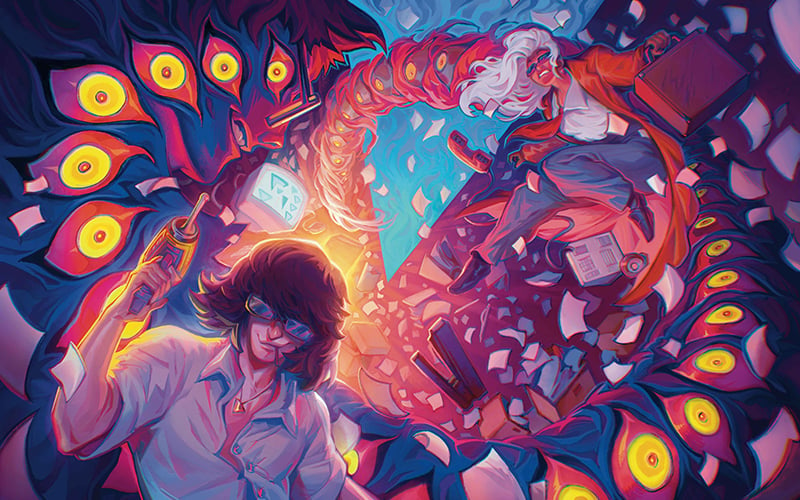
Noel: So yeah, I've been enjoying it. I don't think there's a single right answer for these kinds of things, but I think it really works here in this particular alchemy of setting and mechanics.
Marsh: Absolutely—a lot of the things I really like about this game, I wouldn't necessarily want to be in every game, but here it's so refreshing. The whole Ask the Agency thing where you're having a very indirect effect on the world in comparison to, you know, casting fireball or whatever—there's just such a lot of creativity involved. The reason that I love those mixed successes in something like Blades in the Dark is because you're doing something comparatively trivial, taking a single action. And so in order to create dramatic momentum, you need those mixed successes. Whereas, here, I think so much creativity has been spent on just designing what it is that is about to happen that to impede that with a lot of failure states would actually feel thwarting to the player. It's quite nice that you just get to say, "No, this does happen. We've spent enough time thinking about this!" But you know you will pay for that down the line.
Noel: Yeah. That's interesting. It does a nice thing for the fiction, too: the Agency is basically all powerful. Anything you want is possible. But what's the cost?
Marsh: Maybe we should talk about the characters and the way that they are built from the three components: the Anomaly which has bound to them and lends them their powers; their Reality, which defines their social standing and origin story as a character; and their Competency, which is how they apply themselves professionally, and determines, among other things, how their QAs are apportioned. My character is a Timepiece Newborn Barista, for instance: he has fused with an Anomaly that grants him power over time; has arrived straight from 1930 to the current day; and seeks to please while getting everyone's name wrong. At first I thought this was just a way of Mad Lib-ing your way to an idiosyncratic character.
Noel: Yeah, Numenera does the same thing.
Marsh: Right. It's not an uncommon technique. But what Triangle Agency does is turn each of those components of your character into a separate progression system, which is in competition with the others. And not only that! Advancing one or another of them offers different insights about you, your role in the agency and the world! And then, if you choose to lean into one, not only do you get a completely different path to empowerment, but your motivations fundamentally change as a character. It's just pretty brilliant stuff. But it's hard to talk about without spoilers!
Noel: That process of discovery is a big part of the game. I think people who aren't initially taken by the premise might actually find that very interesting.

Marsh: And this ties into the design of the book as a whole, right? The separation between what the GM knows, what the player knows, what the player will later know.
Noel: And let me tell you also, the GM layout looks nothing like the rest of the book.
Marsh: Of course.
Noel: Not even a little bit. And there is a super cool meta reason that I can't talk about—which is a bummer—but it is fascinating!
Marsh: It's probably not a spoiler to say that the early player-facing parts are written from the perspective of a Triangle Agency employee guide, but the further you get into advancement, ████ █████████ ██ ██ ████. And that changes not only what you think about the game, but the graphic design of the book! Even the earliest revelations you get are exciting; there's a sort of gleeful, "Oh, I'm really allowed to do this?"
Noel: The moment when you ███ ████ ███████ for the first time and neither of our other two players had any concept as to why—that was pretty awesome. And there's a lot more to come! So that has been really cool to watch. I think one of my favorite little details is █████ ██████████ ███ ██ ████ ████. You don't necessarily notice it when you read the player guide for the first time, but if you go back, knowing what you now know, █████ ███ ██████ comes up a lot and in very particular ways, so ████ █████ ████ ███ ██████ █████ what is being communicated to you and why. And that continues in extremely dramatic fashion in the GM section as well.
Marsh: Wait, so are there big reveals for the GM in the same way that there are for players?
Noel: I don't think it's exactly the same, but the first few pages of the GM section are like, whoa, like there's a lot more to this game. ███ ██████ ███ ███ ██████ ███ ██ █ ██████ ███ But the tracks that players advance along for their Anomaly, Reality and Competency are like nothing else I've ever seen in terms of motivating player behavior, and for making you think, "Oh, wait a minute. What do I want to do here? What are my priorities?" in a way that links narrative and mechanics. It's brilliant. It just is brilliant.
~~~
At this point, a fleet of black SUVs pulled up, so I had to cut the feed, zip myself into a foil-lined onesie and hide in a crawlspace for three days. Thank god for Gatorade and adult diapers, eh? Anyway, play Triangle Agency. And don't believe the hog videos.
Add a comment: